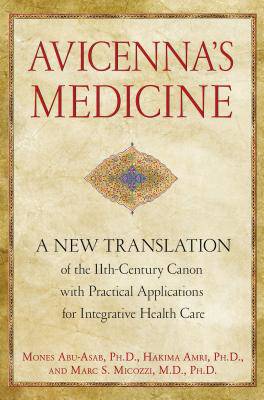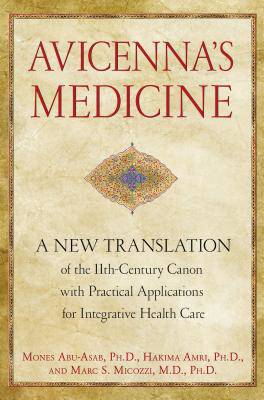
Door een staking bij bpost kan je online bestelling op dit moment iets langer onderweg zijn dan voorzien. Dringend iets nodig? Onze winkels ontvangen jou met open armen!
- Afhalen na 1 uur in een winkel met voorraad
- Gratis thuislevering in België vanaf € 30
- Ruim aanbod met 7 miljoen producten
Door een staking bij bpost kan je online bestelling op dit moment iets langer onderweg zijn dan voorzien. Dringend iets nodig? Onze winkels ontvangen jou met open armen!
- Afhalen na 1 uur in een winkel met voorraad
- Gratis thuislevering in België vanaf € 30
- Ruim aanbod met 7 miljoen producten
Zoeken
Avicenna's Medicine
A New Translation of the 11th-Century Canon with Practical Applications for Integrative Health Care
Mones Abu-Asab, Hakima Amri, Marc S Micozzi
Hardcover | Engels
€ 44,45
+ 88 punten
Omschrijving
The first contemporary translation of the 1,000-year-old text at the foundation of modern medicine and biology - Presents the actual words of Avicenna translated directly from the original Arabic, removing the inaccuracies and errors of most translators - Explains current medical interpretations and ways to apply Avicenna's concepts today, particularly for individualized medicine - Reveals how Avicenna's understanding of the "humors" corresponds directly with the biomedical classes known today as proteins, lipids, and organic acids A millennium after his life, Avicenna remains one of the most highly regarded physicians of all time. His Canon of Medicine, also known as the Qanun, is one of the most famous and influential books in the history of medicine, forming the basis for our modern understanding of human health and disease. It focused not simply on the treatment of symptoms, but on finding the cause of illness through humoral diagnosis--a method still used in traditional Unani and Ayurvedic medicines in India. Originally written in Arabic, Avicenna's Canon was long ago translated into Latin, Persian, and Urdu, yet many of the inaccuracies from those first translations linger in current English translations. Translated directly from the original Arabic, this volume includes detailed commentary to explain current biomedical interpretations of Avicenna's theories and ways to apply his treatments today, particularly for individualized medicine. It shows how Avicenna's understanding of the humors corresponds directly with the biomedical definition of proteins, lipids, and organic acids: the nutrient building blocks of our blood and body. With this new translation of the first volume of his monumental work, Avicenna's Canon becomes just as relevant today as it was 1,000 years ago.
Specificaties
Betrokkenen
- Auteur(s):
- Uitgeverij:
Inhoud
- Aantal bladzijden:
- 480
- Taal:
- Engels
Eigenschappen
- Productcode (EAN):
- 9781594774324
- Verschijningsdatum:
- 4/07/2013
- Uitvoering:
- Hardcover
- Formaat:
- Genaaid
- Afmetingen:
- 160 mm x 231 mm
- Gewicht:
- 771 g

Alleen bij Standaard Boekhandel
+ 88 punten op je klantenkaart van Standaard Boekhandel
Beoordelingen
We publiceren alleen reviews die voldoen aan de voorwaarden voor reviews. Bekijk onze voorwaarden voor reviews.











